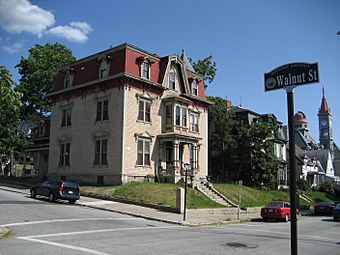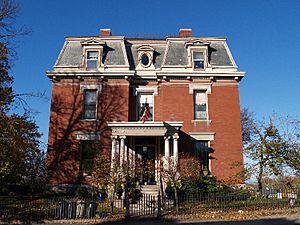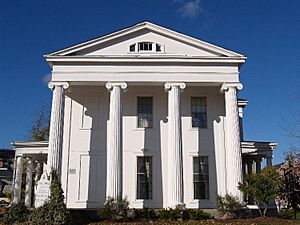Highlands Historic District (Fall River, Massachusetts) facts for kids
Quick facts for kids |
|
|
Highlands Historic District
|
|

Corner of Walnut & Rock Street
|
|
| Location | Fall River, Massachusetts |
|---|---|
| Built | 1840 |
| Architectural style | Late 19th And 20th Century Revivals, Greek Revival, Late Victorian |
| MPS | Fall River MRA |
| NRHP reference No. | 83000677 |
| Added to NRHP | February 16, 1983 |
The Highlands Historic District is a special area in Fall River, Massachusetts. It's known for its beautiful old buildings and homes. This district covers a large area, roughly bordered by June, Cherry, and Weetamoe Streets, and Lincoln, Highland, President, North Main, and Hood Avenues. It's located just north of another historic area called the Lower Highlands Historic District.
This historic district was added to the National Register of Historic Places in 1983. This means it's recognized as an important place in American history. It spans over 1,400 acres and includes more than 300 buildings.
Contents
History of the Highlands District
The area we now call the "Highlands" in Fall River used to be a large farm known as the Rodman Farm. It sits on a high ridge, offering great views of the Taunton River and Mount Hope Bay.
In 1843, a huge fire destroyed much of Fall River's downtown area. After this, many wealthy mill owners and their families decided to move away from the busy city center. They chose to build their new homes in the quieter, higher parts of the city, which became the Highlands.
Most of the homes in the Highlands Historic District were built between 1840 and 1925. Only one home, the Church-Tory house (built around 1750) at 96 French Street, is older than this main building period.
The district also includes North Park. This park was designed in the mid-1880s by the famous landscape architects, the Olmsted Brothers.
Important Buildings in the District
The Highlands Historic District has many important buildings. These are called "contributing properties" because they help show the history and character of the area. Most of these buildings are homes, but there are also schools, fire stations, and churches.
Homes in the Highlands
Many different styles of homes can be found here. They show how architecture changed over time.
- Charles Shove House (around 1850) at 715 High Street
- Church-Tory House (around 1750) at 96 French Street
- Jefferson Borden House (around 1840) at 386 High Street
- Remington-Borden House (around 1858) at 511 Rock Street
- Edmund Chase House (around 1874) at 388 Rock Street
- Philip Borden House (around 1884) at 669 Rock Street
- Simeon Borden House (1876) at 484 Highland Street
- Charles Buffington House (1882) at 216 Prospect Street
- Maplecroft (Allen-Borden House) (1889) at 306 French Street
- Michael T. Hudner House (1900) at 674 Highland Avenue
Schools and Public Buildings
The district also includes buildings that served the community.
- Westall School (1907) (1907) at 276 Maple Street
- Fall River Technical School (1929) at 290 Rock Street
- Quequechan Firehouse (1873) (1873) at 330 Prospect Street
- Anawan No. 6 Firehouse (1873) (1873) on North Main Street
Churches in the District
Several historic churches are part of the Highlands.
- First Congregational Church (1913) at 282 Rock Street
- United Presbyterian Church (1924) at 414 Rock Street
- Temple Beth-El (1928) at 385 High Street
Other Important Buildings
Some buildings in the Highlands Historic District are so important that they have their own separate listings on the National Register of Historic Places.
- B.M.C Durfee High School (1886) at 289 Rock Street, added in 1981
- Osborn House (1843) at 456 Rock Street, added in 1980
 | Aurelia Browder |
 | Nannie Helen Burroughs |
 | Michelle Alexander |





